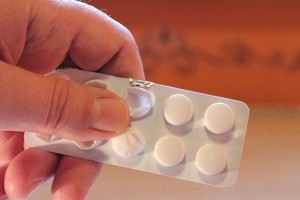Contributor: Hugh C. McBride, BA, clinical content team member, Timberline Knolls
 It is impossible to overemphasize the importance of addressing all co-occurring conditions during treatment for eating disorders. For example, many women and girls who are struggling with an eating disorder turn to weight loss supplements as an unhealthy means of helping them lose dangerous amounts of weight.
It is impossible to overemphasize the importance of addressing all co-occurring conditions during treatment for eating disorders. For example, many women and girls who are struggling with an eating disorder turn to weight loss supplements as an unhealthy means of helping them lose dangerous amounts of weight.
The abuse of or addiction to weight loss supplements is not exclusive to individuals with eating disorders, but among this already vulnerable population, this type of substance abuse can significantly increase both the risk of long-term damage and the difficulty of achieving lifelong recovery.
The Variety of Weight Loss "Supplements"
The term “weight loss supplement” is a broad category that encompasses substances such as vitamins, minerals, botanicals, herbs, amino acids, enzymes, and similar products. Such supplements are available on a non-prescription (over-the-counter) basis, and are often marketed as “all natural.”
Many are also given names that emphasize quick weight loss with little effort. Examples of this type of naming include Slim Trim U, Dream Body Slimming Capsule, SlimEasy Herbs, 1 Day Diet, Magic Slim Tea, and Perfect Body Solutions.
It is no surprise that both the relative ease of access and the enticing packaging can make weight loss supplements extremely attractive to people who are desperate to achieve unhealthy levels of weight loss.
On the Shelf Doesn't Mean Safe
 However, as the U.S. Food and Drug Administration has made many efforts to clarify, the presence of weight loss supplements on the shelves of stores in the United States does not mean that these substances are approved for safe unmonitored use.
However, as the U.S. Food and Drug Administration has made many efforts to clarify, the presence of weight loss supplements on the shelves of stores in the United States does not mean that these substances are approved for safe unmonitored use.
The Federal Food, Drug and Cosmetics Act (as amended by the Dietary Supplement Health and Education Act of 1994), includes language establishing that manufacturers of weight loss supplements do not need to secure approval from the FDA prior to releasing their supplements for sale.
U.S. law does require companies to ensure that their weight loss supplements are safe and that any claims made in the marketing of these products are true, but this clearly provides a large loophole through which many dangerous substances can pass into the hands of people who are struggling with an eating disorder.
Jason Humbert, a senior regulatory manager at FDA, made this very clear in a consumer update on the FDA website. Mr. Humbert is quoted as having said, “Just because you see a supplement product on a store shelf does not mean it is safe.”
What the FDA Can Do
The FDA is only able to get involved when questions arise concerning the safety of a weight loss supplement or the accuracy of its marketing materials. Possible FDA actions include:
- Issuing warning letters
- Seizing supplements
- Ordering their removal from store shelves
- Initiating criminal prosecutions against offending manufacturers
In 2014 alone, the FDA issued 30 public notifications to warn of potentially dangerous weight loss supplements, and took the additional step of ordering seven supplements to be pulled from sale.
Among the reasons cited by the FDA for warning about or ordering the recall of weight loss supplements are that the substances were associated with increased risk of hypertension, heart attack, stroke, and similarly serious medical conditions.
The Mayo Clinic's Warnings
 The FDA is not the only respected entity to advocate strongly against the dangers of weight loss supplements. The Mayo Clinic, one of the nation’s premier medical organizations, has warned of the many dangers of abusing weight loss supplements, and questioned the veracity of claims made by supplement manufacturers.
The FDA is not the only respected entity to advocate strongly against the dangers of weight loss supplements. The Mayo Clinic, one of the nation’s premier medical organizations, has warned of the many dangers of abusing weight loss supplements, and questioned the veracity of claims made by supplement manufacturers.
For example, raspberry ketone is a supplement that is often sold for its purported weight loss properties, and is marketed as being “clinically proven.”
However, the “clinical proof” offered by the manufacturer consists of the results of one eight-week study involving a small group of subjects and a supplement that contained several ingredients. Interpreting this limited research as documentation of raspberry ketone’s effectiveness and safety would require a leap of logic that is far from consistent with rigorous clinical standards.
The Devastating Effects of Weight Loss Supplement Addiction
Abusing weight loss supplements is a potentially dangerous activity for anyone. For someone who is already struggling with an eating disorder, the potential damage to both physical and mental health can be devastating.
For this reason, a person who is dealing with an eating disorder and also abusing weight loss supplements should make immediate arrangements to consult with a counselor, therapist, or other appropriate expert to determine the type and level of treatment that can effectively address both the eating disorder and the supplement abuse.
Eating disorders can be particularly difficult to treat, and the presence of co-occurring conditions can only add to the challenge. But regardless of how complex the problem is, effective treatment options do exist, and recovery is possible. What matters most is ensuring that the patient is matched with the professional or program that is best suited to meeting all of her needs and putting her back on the path to a promising and productive future.
References:
[1] http://www.fda.gov/ForConsumers/ConsumerUpdates/ucm246742.htm
About the Author:
“Weight Loss Supplement Addiction and Eating Disorders” was written by Timberline Knolls clinical content team member Hugh C. McBride. Hugh has several years of experience researching and writing on a wide range of topics related to behavioral healthcare. He has a Bachelor of Arts degree from Grove City College.
Site Description:
Timberline Knolls is one of the nation’s premier treatment centers for women and girls who are struggling with eating disorders, alcohol abuse, drug addiction, and other co-occurring disorders.
Housed on 43 wooded acres in Lemont, Illinois (just a few miles southwest of Chicago), Timberline Knolls is a place of hope and healing where clients receive clinically superior treatment in an atmosphere of serenity and tranquility.
The opinions and views of our guest contributors are shared to provide a broad perspective of addictions. These are not necessarily the views of Addiction Hope, but an effort to offer a discussion of various issues by different concerned individuals.
We at Addiction Hope understand that addictions result from multiple physical, emotional, environmental, and genetic factors. If you or a loved one are suffering from an addiction, please know that there is hope for you, and seek immediate professional help.
Published on March 13, 2015
Reviewed and Updated by Jacquelyn Ekern, MS, LPC on January 11, 2021
Published on AddictionHope.com
